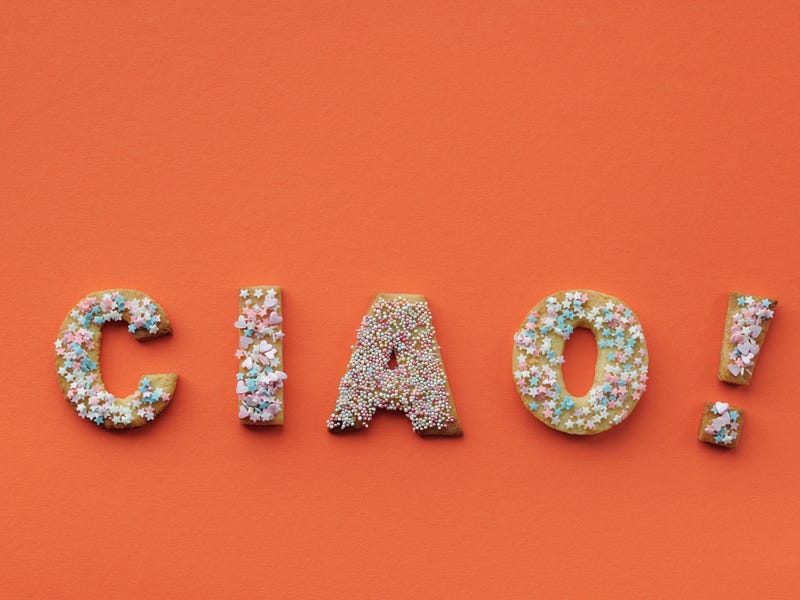Hey! How are you? If your standard response to this question in Italian is Bene, then this article is for you.
All jokes aside, How are you? is probably the first question we learn in a foreign language, and it’s easy to fall into the trap of using the same generic response out of comfort (bene! / good!).
But what’s the fun in that? In addition to expanding your own vocabulary, it’s important to learn different ways to ask and answer this question so that you can properly express yourself in different situations. Aside from that, it can also help you develop better communication skills with just about anyone you meet, after you've said hello in Italian, and asked someone their name in Italian, ranging from a flight attendant to a new best friend.
In this article, you’ll learn how to ask how someone is feeling and respond to this question in Italian in a range of contexts. There are also a few cultural elements that we’ll talk about, too!
So, really: How are you doing?
Alright, so maybe not everyone wants to hear the play-by-play of your awful morning. But that doesn’t mean you have to rely on a standard Bene! or Tutto bene! all the time. In fact, it isn’t all that uncommon to share an actual response about how you’re doing when conversing with Italian speakers.
Whether you’re traveling throughout Italy or learning about the culture from the comforts of your home, you may have noticed that Italians can be expressive. This cultural element can also impact the standard exchange of how you’re feeling.
You can also download your free Italian language essentials eBook here, a trusty guide to all the Italian basics.

How are you in Italian
Just like in English, a sarcastic smile or simple gesture could change the entire meaning of how are you in Italian, and its many possible answers, so keep that in mind as you read through this article. Don’t be surprised if you sometimes notice a hint of irony from Italian speakers!
How to ask “How are you?” in Italian in formal situations
Let’s start with the formal situations first. These situations can range from important clients at work, elders, or even a checkout clerk at a supermarket. Speaking to someone with a formal tone usually means that you would address that person in the third person, or the Lei form.
If you’re traveling around Italy and aren’t sure when to use the formal Lei form instead of the informal tu form, you might want to err on the side of caution and stick with the Lei form. Why? Generally, this form is used to politely address someone. In some cases, using the tu form with a stranger could even be considered rude - like using it with an elderly person or a medical professional, for instance.

It might seem like a lot to think about, but don’t stress out too much! The grammatical changes aren’t that complicated when it comes to asking how someone is. The biggest changes will be with the endings of certain words. For instance:
Tu: stai / Lei: sta
Tu: hai / Lei: ha
You’ll also notice a reflexive verb used in the table below (sentirsi - to feel). In that case, both the first and second parts of the verb phrase change.
Tu: ti senti / Lei: si sente
| English | Italian | IPA | Pronunciation |
| How are you? | Come sta? | ‘kome ‘sta | co-meh-sta |
| How are you doing today? | Come sta oggi? | ‘kome ‘sta ɔd͡ʒːɪ | co-meh-sta-aw-gee |
| Did you have a good day? | Ha passato una bella giornata? | a pas͡sˈato ˈuna bˈɛlla d͡ʒornˈata? | ah pass-ah-toe uw-na beh-la jour-nah-tah |
| How are you feeling? | Come si sente? | ‘kome ssi ‘sɛnte | co-meh see sen-teh |
How to ask “How are you?” in informal situations
In this table, you’ll see the informal versions of the questions above. There are also a few extra phrases in this table.
| English | Italian | IPA | Pronunciation |
| How are you? | Come stai? | ˈkome ˈstai̯ | co-meh-sty |
| How are you doing today? | Come stai oggi? | ˈkome ˈstai̯ ɔd͡ʒːɪ | co-meh-sty-aw-gee |
| How are you doing? | Come andiamo? | ‘kome anˈdjamo | co-meh an-dee-ah-mow |
| Did you have a good day? | Hai passato una bella giornata? | aj pas͡sˈato ˈuna bˈɛlla d͡ʒornˈata? | ah pass-ah-toe uw-na beh-la jour-nah-tah |
| How are you feeling? | Come ti senti? | ‘kome ti ‘sɛnti | co-meh-tee-sen-tee |
| What are you up to? | Che fai di bello? | ˈke ˈffai̯ di ˈbɛllo | ke fi dee beh-low |
| Did you sleep well? | Hai dormito bene? | ˈai̯ dorˈmito ˈbɛne | ai door-mee-tow beh-neh |
| Are things getting better?* | Va meglio? | vva 'mɛʎo | va meh-lee-oh |
*This could also be used in a formal situation if you want to ask if someone is doing better, or if things are better for them.
Using Italian slang to ask “How are you?”
Alright, now we can have some fun here and really open up our Italian horizons. Italian slang is really fun! You’ll notice that this table has many more options to ask this simple question, but the nuances between them are anything but simple! You would likely hear and use the phrases in the table below at a coffee shop, a pub, on the train, or anywhere that you would meet and hang out with local Italians. You’ll notice that some phrases are great for meeting someone for the first time, whereas others are perfect for catching up with friends.
Keep in mind that the word allora is used quite a lot in Italian, and you could technically put it in front of any of these questions. It’s a little word that can communicate quite a bit. In this case, it can act as a segue (like the English so), or it can even express feelings.
Let’s use an example with our friend Diego. Imagine that he is engaging in simple chit-chat with a friend, but wants to get to the heart of the matter quickly. He could use allora as a segue to start talking about more serious matters.
Diego: “Allora, tutto ok?” / “So, is everything okay?”
At the same time, allora can also be used in a light-hearted way, or even neutrally! We’ll explore different ways to use this word in some responses as well. But first, read through these questions and practice them!
| English | Italian | IPA | Pronunciation |
| Hey, how are you? | Ehilà, come va? | ei̯ˈla ‘kome vva | ey-la-co-meh-va |
| Are you ok? | Stai bene? | stai̯ 'bɛne | sty beh-neh |
| All ok? | Tutto ok? | 'tutːo o'kɛj | two-tow ok |
| What’s up? | Come butta? | ‘kome ˈbutta | co-meh boo-tah |
| How’s it going? | Come te la passi? | ‘kome te la ˈppassi | co-meh-teh-la-pass-ee |
| What’s new? / How’s it going? | Che si dice? | ke ssi ˈditʃe | ke-see-dee-che |
| So, what’s up? / So, what’s been going on? | Allora, cosa mi racconti? | alˈlora ˈkɔza mi rakˈkonti | ah-lor-ah co-sa me ra-con-tee |
| How’s life? / How’s life been treating you? | Come va la vita? | ‘kome va lla ‘vita | co-meh va la vee-tah |
| What’s going on? | Che succede? | ‘ke sutˈtʃɛde | ke sue-che-deh |
| Is something wrong? | C’è qualcosa che non va? / Qualcosa non va? | tʃˈɛ kkwalˈkɔza ‘ke ‘nnon va / kkwalˈkɔza ‘nnon va? | che kwal-ke che non vah? / kwal-co-sa non vah? |
| What’s new? / Anything new? | Ci sono novita? / C’è qualche novita? | tʃi sono novita / tʃˈɛ ˈkwalke novita | chi so-no nov-ee-tah / che kwal-che no-vee-tah |
Different ways to respond in Italian to “How Are You?”
Allora, if you thought that was fun, you’re going to love this next part! Now that we’ve examined lots of ways to ask someone how they are, it’s time to start exploring all the different ways to respond. In order to do that, we need to get into our feelings in Italian…well, just a little bit!
If you’ve ever traveled around Italy, or listened to or watched native Italian speakers communicate, you might have noticed a sense of emotion and body language that is naturally expressed throughout conversations. Because of this, there are so many different ways to answer the simple question of Come stai?, and a simple gesture or stress on certain words can make all the difference.
Like we discussed earlier, Italians probably aren’t always expecting a rhetorical answer when they ask someone how they’re doing. It isn’t uncommon to briefly express your happiness, sadness, or frustration, even if it’s just for a bit.
Remember our friend, allora? You can add it in before any of these responses as well. Let’s check in with our friend Diego again, who is meeting with Roberta. Unfortunately, she isn’t doing so well.
Diego: “Allora, tutto ok?” / “So, is everything okay?”
Roberta: “Allora…potrebbe andare meglio.” / “Well…it could be better.”
Well, well, well…
There’s one more important word to look at: Insomma! This word packs a punch. It has a lot of different meanings, but let’s focus on one for now. Think of it as a somewhat disgruntled: Well… Let’s look at another way that conversation could have gone.
Diego: “Allora, tutto ok?”
Roberta: “Beh…insomma!”
Poor Roberta. Ha visto giorni migliori (She’s seen better days!). But at least these handy one-word responses in Italian do the trick.
The table below generally starts with the responses for the best feelings, then gets neutral, and finishes with the worst feelings. Remember, it also depends on how you express yourself through emotion and body language!

| English | Italian (Singular) | IPA | Pronunciation |
| I’m feeling great, thanks! | Sto benissimo, grazie! | ˈsstɔ ˈbbɛnissimo ˈɡrattsje | sto ben-ees-ee-mow grat-sie |
| Everything is great! | Alla grande! / Tutto alla grande! | alla ‘grande / ‘tutto alla ‘grande | ah-la-gran-deh / two-tow ah-la gran-deh |
| Amazing! (Literally: From God!) |
Da dio! | da ‘ddio | da dee-oh |
| Just wonderful! (Literally: Like a fairytale!) |
Da favola! | da ‘favola | da fa-vo-lah |
| I’m good, thanks! How are you? | Sto bene, grazie! È tu? / È Lei?* | ˈsstɔ ˈbɛne ˈɛ ttu / ˈɛˈllɛi̯ | sto beh-neh grat-sie / eh two |
| Not too bad thanks and yourself? | Non c’è male, grazie. È tu? / È Lei?* | ‘nnon tʃˈɛ ‘male ˈɛ ttu / ˈɛˈllɛi̯ | non che mah-leh grat-sie / eh two |
| All ok! / All good! | Tutto ok! / Tutto bene! | ‘tutto o’kɛi | two-tow ok / two-tow beh-neh |
| Everything’s good. | Tutto a posto! | ‘tutto a ˈpposto | two-tow ah po-sto |
| Things are going well. | Me la passo bene. | ‘me la ‘passo ˈbɛne | meh la pass-oh beh-neh |
| I’m getting by just fine. | Me la cavo. | ‘me la ‘kavo | meh la cah-vo |
| I’m a little tired, but good thank you! | Sono un po’ stanco/a, ma grazie! | sono um ˈpɔ ˈstanko / ‘stanka ma ‘ggrattsje | sow-no oon poh stan-ko / stan-ka ma grat-sie |
| I can’t complain! | Non posso lamentarmi. | ‘nom ‘ˈpɔsso lamenˈtarmi | non poss-oh la-men-tar-mee |
| Could be worse! | Potrebbe andare peggio. | potrebbe an’dare ˈpɛddʒo | po-treb-beh an-dar-eh pej-joe |
| Could be better! | Potrebbe andare meglio. | potrebbe an’dare ˈmɛʎʎo | po-treb-beh an-dar-eh meh-lee-oh |
| I’m doing better. | Sto meglio. | ˈstɔ ˈmɛʎʎo | sto meh-lee-oh |
| I’ve seen better days. | Ho visto giorni migliori. | ˈɔ ˈvvisto ˈdʒorni miʎˈʎori | o vee-sto jor-nee mi-lee-or-ee |
| I’ve been through worse. | Ho visto giorni peggiori. | ˈɔ ˈvvisto ˈdʒorni pedˈdʒori | o vee-sto jor-nee pej-or-ee |
| Same old, same old. | Il solito. | Il ˈsɔlito | il sol-ee-toe |
| Same as always. | Sempre le stesse cose. | ˈsɛmpre ˈle ˈstɛsse ˈkɔze | sem-preh le stess-eh co-se |
| Same as usual. | Tutto uguale! | ‘tutto u’gwale | two-tow ew-gwa-leh |
| Nothing special. | Niente di speciale. | ˈnjɛnte di speˈtʃale | nien-teh dee spe-chal-eh |
| Life goes on. / We’re pulling through. | Si tira avanti. | si ‘tira a’vanti | see tee-rah ah-vahn-tee |
| So-so. | Cosi cosi. | ˈkɔzi ˈkɔzi | co-see co-see |
| I’m having a hard time. | Me la passo male. | ‘me la ‘passo ‘male | meh la pass-oh ma-leh |
| Well… | Insomma… | in’somma | in-som-ma |
| Awful / Lousy (Literally: From the dogs!) |
Da cani! | da ‘kkani | da cah-nee |
| Things are crappy / Like crap. | Da scifo! | da ˈʃifo | da ski-fo |
| Don’t even ask! | Non me lo chiedere! | ‘non ‘me ‘lo ˈkjɛdere | non meh lo kie-de-re |
*È Lei? uses a formal tone to ask someone how they are doing. È tu? is the informal version.
It’s not always “Tutto bene”!
Now that you have all of these great ways to respond to Come stai?, you don’t always have to rely on Bene! or Tutto bene! At least that’s what one popular Italian band, Ex-Otago, thinks. In their hit song, “Tutto Bene”, they sing about wanting to know how someone really feels, rather than just hearing a generic response.
Take a look at some of the lyrics below. We’ve gone through a bit of the vocabulary and grammar in this article, too. Don’t be afraid to sing along. I’ll be the first to admit that this catchy tune can get stuck in your head!
| English | Italian |
| Tell me what you want, but please Don’t ever tell me that Everything’s “all fine, all fine, all fine” All good, all good, it’s always going well Always all good, all good, all good All good, all good, just terribly “good” Tell me how you’re doing, just tell me how you’re doing Tell me about your tragedies, tell me about when you’re going on vacation Tell me what you’re up to, just tell me what you’re up to… |
Tu dimmi quello che vuoi, ma per favore Non mi dire mai che Va sempre tutto bene, tutto bene, tutto bene Tutto bene, tutto bene, va sempre tutto bene Sempre tutto bene, tutto bene, tutto bene Tutto bene, tutto bene, terribilmente tutto bene Dimmi come stai, dimmi solo come stai Dimmi delle tue tragedie, dimmi quando hai preso ferie Dimmi cosa fai, dimmi solo cosa fai… |
Here’s the video! Tutto Bene
Download our free Italian essentials eBook
Allora? Now you’re ready to share how you’re doing!
With all of these great ways to ask and answer questions about how you’re feeling, you should be feeling prepared to take on new conversations with just about anyone! You never know when a simple answer to Come stai? can lead to an amazing conversation with someone new. It could even help form new friendships!
We hope you keep all of these responses handy and call upon them when you need them. And when your conversation goes way beyond the Come stai?, make sure to brush up on your Italian vocabulary via our free blog lessons here and check out other ways to learn Italian - even online!




